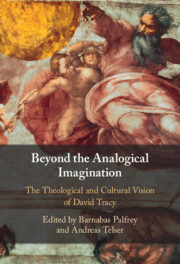Book contents
- Beyond the Analogical Imagination
- Reviews
- Beyond the Analogical Imagination
- Copyright page
- Epigraph
- Contents
- Contributors
- Acknowledgements
- Introduction
- Part I Theology and Culture
- Part II Public and Beyond
- Part III Church and World
- Part IV From David Tracy
- Chapter 10 Reflections on the Essays
- Chapter 11 On Naming God
- Part V Post-Script
- Bibliography
- Index
Chapter 11 - On Naming God
from Part IV - From David Tracy
Published online by Cambridge University Press: 28 September 2023
- Beyond the Analogical Imagination
- Reviews
- Beyond the Analogical Imagination
- Copyright page
- Epigraph
- Contents
- Contributors
- Acknowledgements
- Introduction
- Part I Theology and Culture
- Part II Public and Beyond
- Part III Church and World
- Part IV From David Tracy
- Chapter 10 Reflections on the Essays
- Chapter 11 On Naming God
- Part V Post-Script
- Bibliography
- Index
Summary
A succinct account of the author’s mature constructive theological investment in a metaphysics of the Infinite. The opening section of this essay indicates a determination to weave metaphysical and soteriological concerns together without any implied separation of these from each other, or, alternatively, any premature collapse of one into the other. Latter parts of the essay then focus on how ‘Infinite Perfection’ came to prominence in Duns Scotus as the principal Christian thought-name for God, to ‘help theologians understand the positive (cataphatic) possibilities for naming God in the Bible and in philosophy as well as the negative (apophatic) limits of our knowledge’. Scotus’s confidence in abstract conceptual analysis and in ‘the power and ability of our finite minds’ helped to lead the Franciscan to crown ‘Infinity’ (above ‘Being’) as the highest name of the divine perfection. In this Scotus is also an ancestor of Descartes’s later modern discovery of the excessive idea of the Infinite within the human mind.
- Type
- Chapter
- Information
- Beyond the Analogical ImaginationThe Theological and Cultural Vision of David Tracy, pp. 214 - 220Publisher: Cambridge University PressPrint publication year: 2023

